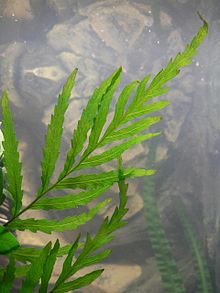Bolbitis heudelotii
| Bolbitis heudelotii | |
|---|---|

| |
| Scientific classification | |
| Kingdom: | Plantae |
| Clade: | Tracheophytes |
| Division: | Polypodiophyta |
| Class: | Polypodiopsida |
| Order: | Polypodiales |
| Suborder: | Polypodiineae |
| Family: | Dryopteridaceae |
| Genus: | Bolbitis |
| Species: | B. heudelotii |
| Binomial name | |
| Bolbitis heudelotii | |
| Synonyms[2] | |
Bolbitis heudelotii, also known as the African water fern,[3] creeping fern, and Congo fern, is native to subtropical and tropical Africa, from Ethiopia west to Senegal; and down to northern South Africa.[4]
Description
Bolbitis heudelotii, named for the botanical explorer of West Africa Jean-Pierre Heudelot (1802–1837),[5] is an aquatic polypody fern growing submerged in rivers and streams, attached to rocks or wood by the threadlike rootlets extending from its rhizomes. It has dark green, pinnate leaves 15–40 cm long and 15–25 cm broad. It grows submerged. The water in its native habitat is fast-moving over sandy or rocky bottoms, very clean, not very hard and slightly acidic. The roots cling to rocks and the sandy beds.[citation needed]
Cultivation
In the aquarium, B. heudelotii requires water temperatures of 20–28 °C and moderately acidic ('soft') to neutral water with a pH range of 5.0–7.0,[6] but tolerates a wide range of light levels. It does best in flowing water.[7][8][3]
This species is often used as a midground specimen plant in tropical freshwater aquaria. Propagation is from divisions and cuttings from the rhizome.[9]
It seems to be intolerant to being crowded and to fish excreta.[10] It is best grown secured to a piece of wood rather than planted direct in the substrate. Additional CO2 seems to boost growth and it grows best in a rather shady position.[citation needed]
Propagation is by division of the rhizome. It is a slow-growing plant.[citation needed]
References
- ^ Ghogue, J.-P. (2020). "Bolbitis heudelotii". IUCN Red List of Threatened Species. 2020: e.T136662206A136662215. doi:10.2305/IUCN.UK.2020-2.RLTS.T136662206A136662215.en. Retrieved 2 June 2024.
- ^ "Bolbitis heudelotii (Bory ex Fée) Alston". Plants of the World Online. Royal Botanic Gardens, Kew. Retrieved 2 June 2024.
- ^ a b "Bolbitis heudelotii". Aquarium World. Federation of New Zealand Aquatic Societies (FNZAS). Retrieved 5 Nov 2016.
- ^ "Bolbitis heudelotii". Germplasm Resources Information Network. Agricultural Research Service, United States Department of Agriculture. Retrieved 21 January 2018.
- ^ Kasselmann, Christel, Aquarium Plants (Krieger, Malabar, Florida) 2003 :157.
- ^ B. heudelotii will not thrive in alkaline water at pH over 7.0: "leaves will become blackened and stained" (Kasselmann 2003).
- ^ Tropica: Bolbitis heudelotii
- ^ Vumba Nature Reserve: Fern list Archived July 3, 2007, at the Wayback Machine
- ^ Hiscock, P. (2003). Encyclopedia of Aquarium Plants Interpret Publishing, United States and Canada ISBN 0-7641-5521-0; Kasselmann (2003).
- ^ Schmidt, Jurgen, P. (2002). Aquarium Plants Interpret Publishing, UK ISBN 1-84286-034-8
External links
- Tropica.dk
- AquaHobby Archived 2007-10-12 at the Wayback Machine
- Bolbitis heudelotii in West African plants – A Photo Guide.

